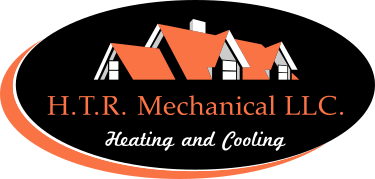Your Guide to Annual Furnace Maintenance
As the seasons change and cooler temperatures arrive, your furnace becomes one of the most important appliances in your home. You rely on it to keep your family warm and comfortable throughout the winter. But for it to work safely and efficiently, it needs regular attention. That’s where annual furnace maintenance comes in.
Just like your car needs a regular service to keep it running smoothly, your furnace requires an annual check-up. This simple step can prevent unexpected breakdowns, lower your energy bills, and ensure your system operates safely when you need it most. Many furnace manufacturers even recommend annual inspections by a certified technician to keep the warranty valid.
This guide will walk you through everything you need to know about annual furnace maintenance. We’ll cover the benefits, explain what a professional inspection includes, and even share some simple tasks you can do yourself. By the end, you’ll understand why prioritizing your furnace’s health is a smart investment for your home and family.
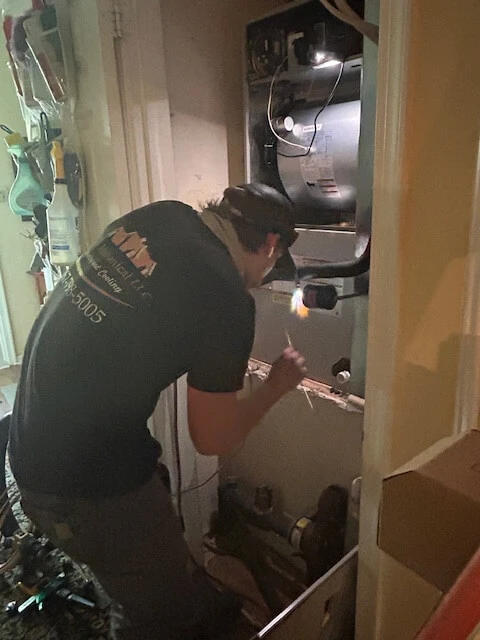
Why Annual Furnace Maintenance is Essential
Scheduling furnace maintenance once a year is one of the best things you can do for your heating system. Neglecting your furnace can lead to decreased efficiency, surprise repairs, and a shorter lifespan for your equipment. An annual tune-up ensures your furnace is clean, inspected, and ready to perform at its best for the colder months. The ideal time to schedule this service is in the early fall, before you start using your furnace daily. This allows a technician to catch and fix any minor issues before they become major problems, ensuring you have reliable heat when the first cold snap hits.
Key Benefits of Regular Furnace Maintenance
Still not convinced? Here are the top three reasons to make annual maintenance a priority:
- Improved Energy Efficiency: A well-maintained furnace operates more efficiently. During a service, a technician cleans and adjusts components to optimize performance. This means your furnace uses less energy to heat your home, which translates directly to savings on your monthly utility bills. The U.S. Department of Energy notes that combining proper equipment maintenance with home insulation can save you up to 30% on your energy costs.
- Increased Longevity: Your furnace is a significant investment. Regular maintenance helps you get the most out of it by extending its service life. With proper care, a forced-air furnace can last between 15 and 30 years. Catching small problems early prevents wear and tear that can lead to premature system failure.
- Enhanced Safety: This is the most critical reason for annual maintenance. A malfunctioning furnace can pose serious safety risks, including carbon monoxide (CO) leaks. A cracked heat exchanger in a gas furnace, for example, could release this odorless, deadly gas into your home. A professional inspection includes checking for leaks, ensuring safety controls are working, and verifying that the system is venting properly.
Understanding Your Furnace
To appreciate the importance of maintenance, it helps to know a little about how your furnace works.
Types of Furnaces and Their Maintenance Needs
While there are several types of heating systems, forced-air furnaces are the most common in American homes. These systems heat air and distribute it through ductwork. They can be powered by natural gas, oil, propane, or electricity. Each type has specific maintenance needs:
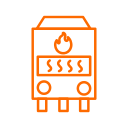
Gas Furnaces
Require checks on the burners, heat exchanger, and ventilation system to prevent carbon monoxide leaks.
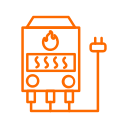
Electric Furnaces
Need inspections of the heating elements and all electrical connections to ensure they are safe and functional.
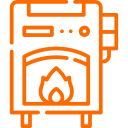
Oil Furnaces
Demand more frequent filter changes and regular inspections of the burner nozzle to prevent clogs.

Key Components of Your Furnace
A typical forced-air furnace is a complex system with many interconnected parts. Here are some of the key components an HVAC technician will inspect:
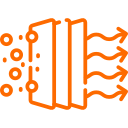
Air Filter
Traps dust, pollen, and other airborne particles.
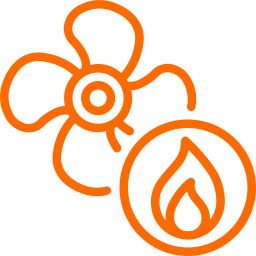
Blower
A fan that circulates heated air through the ductwork.

Burners
Where fuel and air mix to create heat.
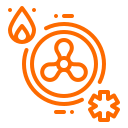
Heat Exchanger
A chamber that transfers heat from the combustion process to the air being circulated.
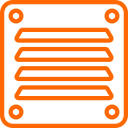
Flue/Vent Pipe
Carries toxic exhaust gases like carbon monoxide safely out of your home.

Ignition System
Either a pilot light (older models) or an electronic igniter that starts the heating process.
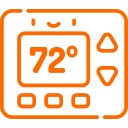
Thermostat
The control center for your heating system.
Professional Furnace Inspection Checklist
When you hire a certified HVAC technician for an annual tune-up, they perform a comprehensive check of your system. While the exact list can vary, a professional inspection typically includes:
- Cleaning the blower components to ensure proper airflow.
- Inspecting the heat exchanger for cracks or corrosion.
- Checking and cleaning the burners for efficient combustion.
- Testing the thermostat calibration to ensure accurate temperature readings.
- Verifying all electrical connections are tight and secure.
- Inspecting the flue system for blockages or leaks.
- Checking safety controls to ensure they are functioning correctly.
- Lubricating all moving parts to reduce friction and wear.
- Testing the system’s startup cycle to confirm it operates as it should.
DIY Maintenance Tasks You Can Do
While a professional tune-up is essential, there are a few simple tasks you can perform yourself to keep your furnace running smoothly between service appointments.
- Change the Air Filter: This is one of the easiest and most important tasks. A clogged filter restricts airflow, forcing your furnace to work harder. Check your filter monthly and replace it at least every three months. If you have pets or allergies, you may need to change it more often.
- Keep Vents and Registers Clear: Make sure furniture, rugs, and other objects are not blocking your air vents. This ensures heated air can circulate freely throughout your home. You can also vacuum the registers to remove dust and debris.
- Check Your Carbon Monoxide Detectors: Since a faulty furnace can be a source of CO leaks, it’s crucial to have working detectors. Test them monthly and replace the batteries every six months. Most units need to be replaced every five to seven years.
- Listen for Unusual Noises: Pay attention to how your furnace sounds. If you hear banging, whistling, or rumbling noises that are out of the ordinary, it could be a sign of a problem that needs professional attention.
When to Call a Professional
While DIY maintenance is helpful, some issues require the expertise of a professional. Call a certified HVAC technician if you notice any of these serious warning signs:
- A yellow or flickering pilot light (it should be a steady blue).
- Strange smells, especially a rotten egg odor, which can indicate a gas leak. If you smell gas, leave your home immediately and call your utility company.
- The furnace cycles on and off frequently.
- Poor or uneven heating throughout your home.
- An unexplained increase in your energy bills.
Invest in Your Home's Comfort and Safety
Your furnace works hard to keep your home warm during the coldest months. By scheduling annual maintenance, you’re not just taking care of your equipment—you’re investing in your family’s safety, your home’s efficiency, and your own peace of mind. A well-maintained furnace runs better, lasts longer, and is less likely to break down when you need it most.
Don’t wait for a problem to arise. Be proactive and schedule your annual furnace tune-up this fall. A small investment in maintenance now can save you from costly repairs and high energy bills down the road, ensuring you stay warm and comfortable all winter long.
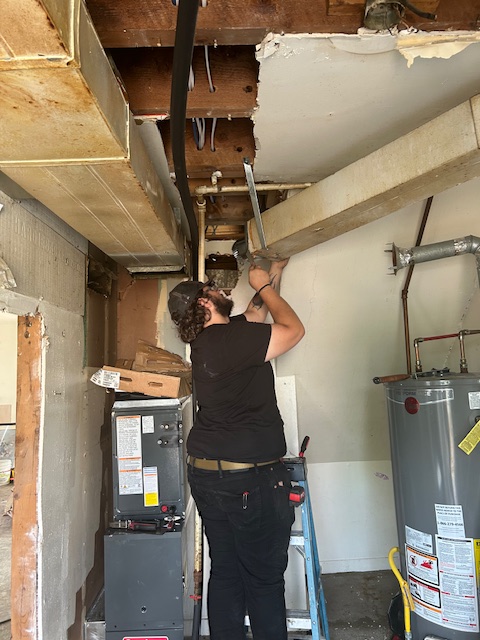
Ask About Our Maintenance Program!
Want even more benefits? Ask about H.T.R. Mechanical’s maintenance program! Members enjoy exclusive deals, priority scheduling, and regular check-ups to keep their systems running smoothly year-round.
Contact The Experts
Service Area:
Bristol, Bensalem, Levittown, Langhorne, Morrisville, Feasterville, Warminster, Doylestown, Southampton, Yardley, Newtown, Horsham, Glenside and throughout Bucks County and Montgomery County areas.
Phone:
(267)798-5005
E-mail:
office@htrmechanical.com
Working Hours
Monday-Friday: 7AM – 5PM;
Saturday-Sunday: By Appointment
24/7 Emergency Service Availability
Schedule Your Annual Furnace Maintenance
Contact our certified HVAC technicians at H.T.R. Mechanical now to book your annual furnace maintenance, and ensure your HVAC system is ready to perform its best when you need it most!
